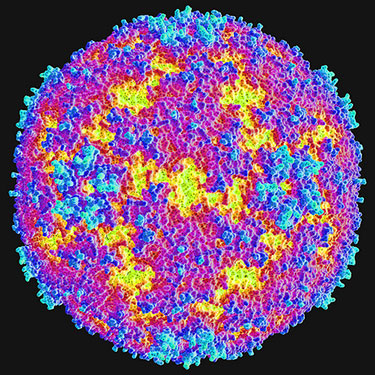
| Oct. 2014 | |||||||||||
| Top stories | |||||||||||
| In the news | |||||||||||
| Photos | |||||||||||
| Contact us | |||||||||||
| Archive | |||||||||||
|
Enterovirus sickens people in 46 states |
The CDC or state public health laboratories have confirmed respiratory illness caused by Enterovirus D68 (EV-D68) in a total of 691 people from 46 states – including Iowa – and the District of Columbia. Most of the cases have been among children and occurred from mid-August to Oct. 10.
 Enterovirus
EnterovirusThe reporting of confirmed cases indicates that at least one person has the illness in each of these states, but does not indicate how widespread the infections are.
Infants, children and teenagers with a history of asthma, other respiratory issues or immune compromised status may develop severe respiratory illness requiring hospitalization. Such patients may need to be placed on droplet plus contact isolation for the duration of their hospitalization. Enforcement of visitation restrictions on younger children is advised by the CDC to prevent potential spread of disease.
EV-D68 is not new, but it hasn't been as commonly recognized in the past. In the upcoming weeks, CDC expects that there will be more confirmed cases of EV-D68 infection. The increase is due to investigations by several states of clusters of people with severe respiratory illness.
Also, specimens are still being tested for EV-D68 by the CDC and state public health laboratories. The State Hygienic Laboratory has the capability to detect the virus.
The Iowa Department of Public Heath (IDPH) will arrange for testing following CDC guidelines. CDC will perform typing testing for surveillance purposes on a priority basis in the following situations:
- Hospitals experiencing increased numbers (above baseline) of admissions (especially to pediatric ICUs) due to respiratory infection. CDC is especially interested in performing typing on specimens that have already tested positive for enterovirus infection.
- Clusters of unknown respiratory illness among populations of any age that are in close contact, such as residential facilities.
Testing in Iowa can be initiated by calling the Center for Acute Disease Epidemiology (CADE) at 800-362-2736. Upon approval, the State Hygienic Laboratory will coordinate specimen collection, completion of test request forms and submission to CDC.
Nasopharyngeal or oropharyngeal swabs are preferred, although washes or aspirates will also be accepted.
There are currently no medications available for treatment for EV-D68 infections, and there is no vaccine available for the virus. Most infections resolve on their own and require only supportive treatment at home:
- Drink plenty of fluids.
- Rest.
- Stay home to prevent spreading the virus.
- Clean frequently touched surfaces.
To help reduce the risk of getting infected with EV-D68:
- Wash hands often with soap and water for 20 seconds.
- Avoid touching eyes, nose and mouth with unwashed hands.
- Avoid kissing, hugging, and sharing cups or eating utensils with people who are sick.
- Disinfect frequently touched surfaces, such as toys and doorknobs, especially if someone is sick.
Enteroviruses are very common viruses; there are more than 100 types. It is estimated that 10 to 15 million enterovirus infections occur in the United States each year, usually in the summer and fall.